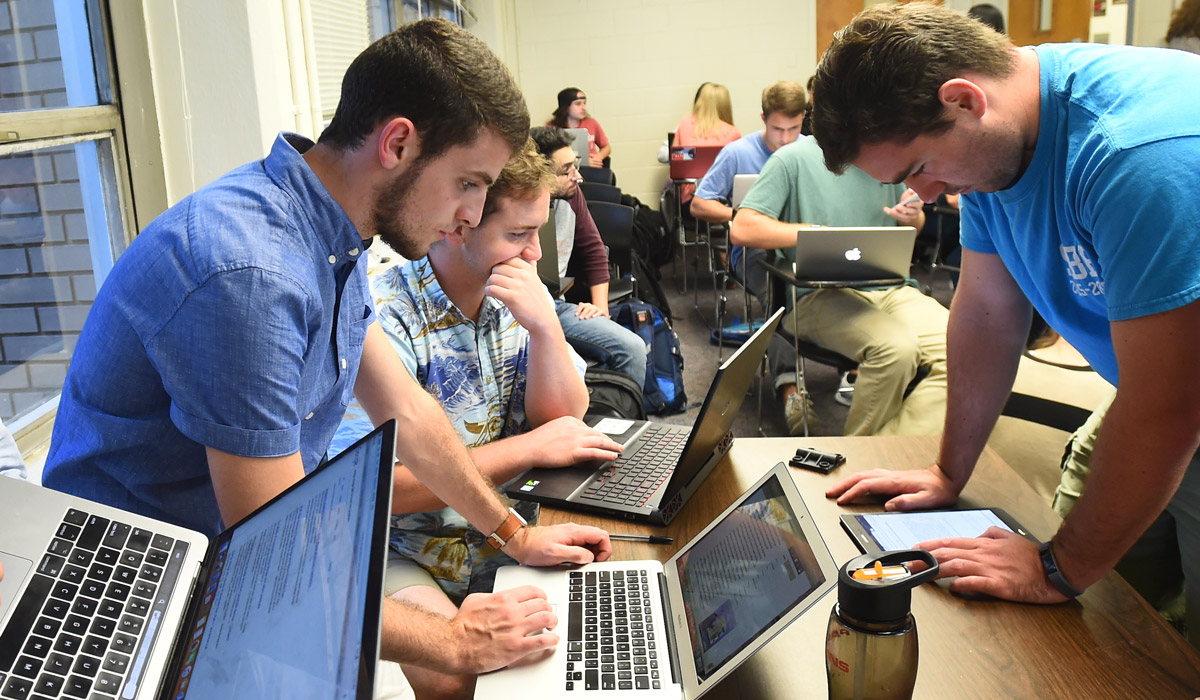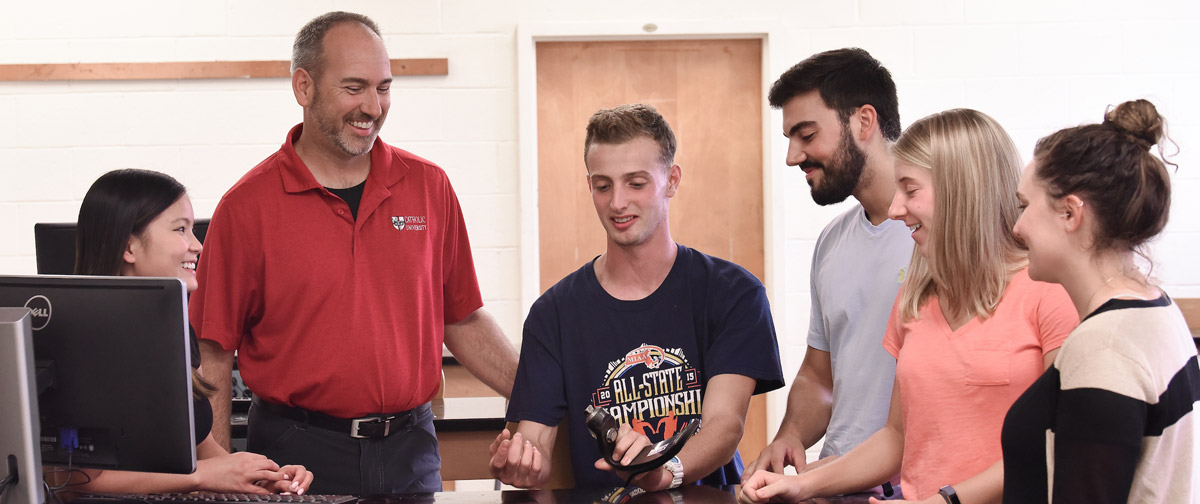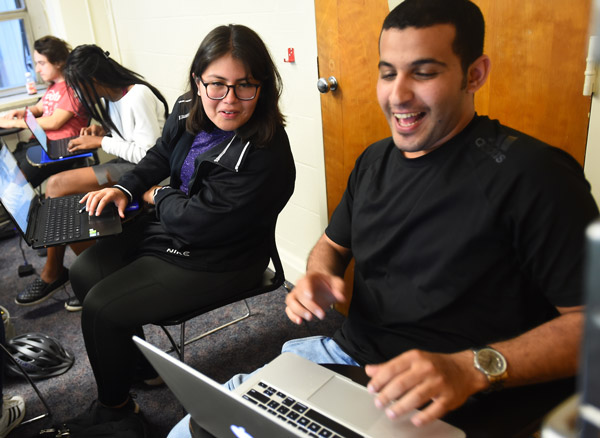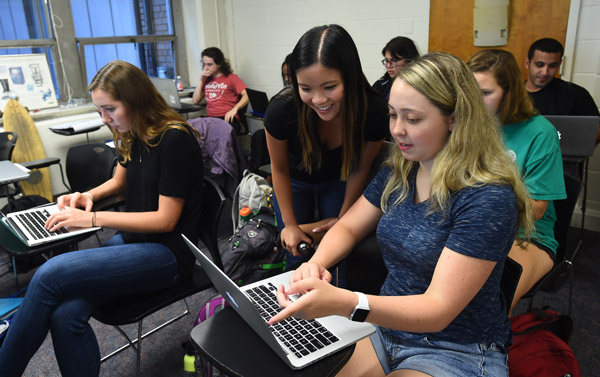

It isn’t often that twin brothers Edward (“Bingo”) and Donald (“Buster”) LaHaye find themselves in the same classroom at the same time. Earlier in their college careers, they took a business class together, in which Buster, an electrical engineering major, was on the home turf of Bingo, a marketing major.
They’re seniors now, and this semester they’re on Buster’s turf. On a Thursday night in September, the brothers were working together on a team project in a corner of a classroom in Pangborn Hall to help solve the power crisis in Puerto Rico following the mass outages left by Hurricane Maria.
“I never thought I’d be in an engineering class with my brother,” says Bingo, who is lending his marketing knowledge to his group’s startup. The new School of Engineering course, Social Innovation Startups, is open to seniors and graduate students from all disciplines. According to its syllabus, the only prerequisite is “interest or passion to discover how an idea can become a real company, by working on a project in a team.”
The hallmark of the course is its challenge to students to use their innovation and marketing skills to serve others. “As we considered a service that could help others in need, we couldn’t help but think about the people of Puerto Rico suffering for so long since the hurricane hit,” said Bingo, whose team is one of two groups working on solutions to the Hurricane Maria crisis.
Across the classroom, another group is huddled together working to develop an origami-style, pop-up mobile clinic for medical missions in the Philippines. Other startups include a highly functional, yet affordable lower-limb prosthetic; a smart greenhouse; a wireless beehive monitoring system; and a stroke-rehabilitation protocol.

Chris Danek, B.M.E 1989, who developed the course and is its co-instructor, pitched the idea for Social Innovation Startups to the School of Engineering more than two years ago. He envisioned an interdisciplinary course in which students would work together to develop a product that serves the common good, and then learn how to launch it into the business world. The course would teach students how to become “design thinkers” — people who aren’t afraid to tackle a problem from any angle, and who know how to harness the expertise of their team.

Danek knows about innovation. The engineering alumnus, who has a Ph.D. from Stanford University and an M.B.A. from the Wharton School of Business, is listed as an inventor on 70 U.S. patents. He led the initial clinical development of bronchial thermoplasty, the first approved intervention to treat asthma. He also co-founded AtheroMed, Inc., where he led the development of a clinically and commercially successful treatment for peripheral arterial disease.
To teach the course, Danek is partnering with co-instructor Greg Behrmann, a faculty member in the School of Engineering who has more than 20 years of experience applying innovation and scaling companies as a successful medical device manufacturer. Students in the course benefit from the guidance of many others, as well; each team is matched with a mentor from the school’s faculty or from the business world. The teams also partner with industry experts who provide practical input and feedback. A steady stream of guest speakers from government agencies, nonprofits, and companies add to the real-world learning experience.
Early this semester, Danek laid out basic tenets of the course for his students: “Have empathy with the people you are trying to serve; conduct interviews; listen to them. To maintain creativity and energy, work in teams. Generate tons of ideas. Make tangible prototypes. Test and refine your solutions.” He encourages students to learn from failure. “Even the most successful entrepreneurs rarely get it right the first time. Share your prototype and iterate based on feedback.”

In addition to developing technical skills, Danek says the course is designed to give students a set of real-world skills including “leadership, teamwork, communication, and collaboration.”
After a pilot course was successfully offered last spring, the course is now spread over two semesters, allowing students adequate time to fully develop, iterate, and test their product or service.
Danek, serial entrepreneur and consultant, says he is at a point in his career where his joy comes from helping others turn innovative ideas into practical solutions. Every Wednesday he takes the “red eye” to Washington, D.C., making himself available to the teams during the day before the Thursday-evening class. Then he’s back on a Friday flight to the West Coast.
“I’ve always been grateful to my alma mater,” he says. “It provided me with the strong foundation for what I’ve achieved, and it’s important to me to contribute to the school’s advancement. I like where the school is headed. The strategic plan laid out by the new dean emphasizes innovation and practical experience in addition to extremely strong academics. The students are energetic and creative, and my interaction with them helps me engage in my own work at a deeper level.”